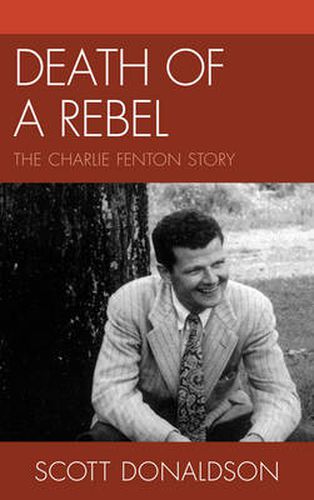Readings Newsletter
Become a Readings Member to make your shopping experience even easier.
Sign in or sign up for free!
You’re not far away from qualifying for FREE standard shipping within Australia
You’ve qualified for FREE standard shipping within Australia
The cart is loading…






Death of a Rebel tells the story of Charles Andrews Fenton (1919-1960), a charismatic teacher, scholar, and writer who took his own life by jumping from the top of the Washington
Duke Hotel in Durham, North Carolina. At the time he was apparently at the peak of his career.
He had written excellent books on Hemingway and Stephen Vincent Benet, had three other
books in press, and was working on a new version of his novel about World War II (a 1945 account won the Doubleday Twentieth Century Fox award). He had earned Guggenheim and ACLS grants. Students flocked to his courses. He was widely regarded as the most popular
professor at Duke.
Charlie Fenton’s story is a compelling one, and takes on further meaning in the context of the times.
An individualist during the notoriously conformist 1950s, he swam against the current, defying
authority and openly inviting controversy. This jaunty refusal to accept received wisdom made
him an appealing figure to many of his students and colleagues. But it was a dangerous stance that
did not sit well with his superiors, and it cost him when his fortunes took a turn for the worse in the
spring and summer of 1960.
Love and war had a lot to do with his suicide as well. Charlie Fenton, who had come down to Duke
from Yale two years earlier with a promotion to full professor, fell in love with one of his graduate
students. His wife, outraged, left and took their son Andy with her. The scandal left him alone and a
social pariah around campus. Then he suffered one of his bouts of depression. Usually these periods
were triggered by trauma, most of it derived from his service as a tail gunner with the RAF bomber command in the summer and fall of 1942. In the past he’d always been able to shake free
of his despondency. This time he was overcome by psychological pain deriving from loss: of wife
and family, of public admiration, of companionship, and worst of all, of self-regard.
The book recounts Fenton’s last days in vivid detail. In writing it, Donaldson had the assistance of
family members, of his devoted students, and even - at a painful distance - of the woman he fell in love with fifty years ago. They all share an abiding sense of what might have been, and a deep
regret that he could not go on to inspire the uncounted students who would never get to know and
admire and learn from him.
$9.00 standard shipping within Australia
FREE standard shipping within Australia for orders over $100.00
Express & International shipping calculated at checkout
Death of a Rebel tells the story of Charles Andrews Fenton (1919-1960), a charismatic teacher, scholar, and writer who took his own life by jumping from the top of the Washington
Duke Hotel in Durham, North Carolina. At the time he was apparently at the peak of his career.
He had written excellent books on Hemingway and Stephen Vincent Benet, had three other
books in press, and was working on a new version of his novel about World War II (a 1945 account won the Doubleday Twentieth Century Fox award). He had earned Guggenheim and ACLS grants. Students flocked to his courses. He was widely regarded as the most popular
professor at Duke.
Charlie Fenton’s story is a compelling one, and takes on further meaning in the context of the times.
An individualist during the notoriously conformist 1950s, he swam against the current, defying
authority and openly inviting controversy. This jaunty refusal to accept received wisdom made
him an appealing figure to many of his students and colleagues. But it was a dangerous stance that
did not sit well with his superiors, and it cost him when his fortunes took a turn for the worse in the
spring and summer of 1960.
Love and war had a lot to do with his suicide as well. Charlie Fenton, who had come down to Duke
from Yale two years earlier with a promotion to full professor, fell in love with one of his graduate
students. His wife, outraged, left and took their son Andy with her. The scandal left him alone and a
social pariah around campus. Then he suffered one of his bouts of depression. Usually these periods
were triggered by trauma, most of it derived from his service as a tail gunner with the RAF bomber command in the summer and fall of 1942. In the past he’d always been able to shake free
of his despondency. This time he was overcome by psychological pain deriving from loss: of wife
and family, of public admiration, of companionship, and worst of all, of self-regard.
The book recounts Fenton’s last days in vivid detail. In writing it, Donaldson had the assistance of
family members, of his devoted students, and even - at a painful distance - of the woman he fell in love with fifty years ago. They all share an abiding sense of what might have been, and a deep
regret that he could not go on to inspire the uncounted students who would never get to know and
admire and learn from him.